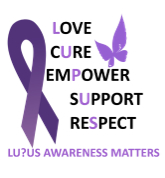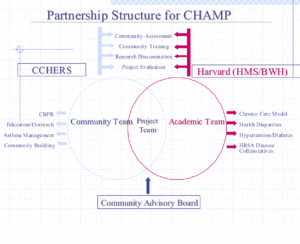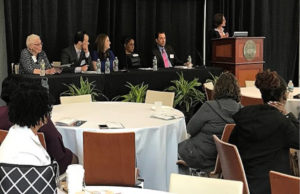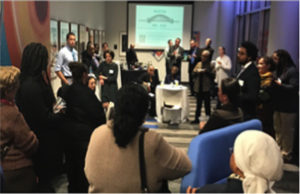Community Engaged Partnered Research
Promote community derived and directed health services, public health, and clinical research in partnerships with academic medical centers, and university researchers that focus on health issues of diverse urban populations.
Practice Based Research
The Boston Community Practice Research Collaborative certified by the Agency for Health Care Research and Quality as a primary care practice based research network and recognized by National Institutes of Health as a minority serving institution. Established in response to an article published in The Boston Globe, February 18, 2002, Hub’s share of NIH fund tops in US. CCHERS has been a leader in conducting community based participatory research; facilitating public participation and community engagement in research; and now promoting PCORI … and “research done differently” in Boston.
Research Engagement
- Community training on the Pipeline-to-Proposal
- Research, Race, and Trust, Panel
- Race, Racism, and Health in Medical Mecca Panel
- 2nd Annual Boston BRI…DGE Conference: Dissemination and Implementation
Featured PCORI grantees in the Boston area to present their work and discuss engagement of stakeholders. Plenary session introducing PCORI. A variety of skill-building workshops. - 3rd Annual Boston BRI…DGE Conference: Healthy Aging in Place
This conference Healthy Aging: Place Matters and featured, Paul Osterman author of “Who Will Care for Us? Long-term Care and the Long-term Workforce” as the keynote speaker. Featured a panel of stakeholders moderated by Secretary of Elder Affairs; a choice of workshops which addressed research, policy, or practice. - Networking Reception for Researchers of Color in Boston
 CCHERS became interested in Lupus research when asked to mediate a community research partnership that involved a support group for African American women diagnosed with the autoimmune disease systemic lupus erythematosus (SLE). The Lupus Awareness and Community Education (LACE) project had been funded by the National Institute of Environmental Health Sciences as a partnership with researchers at Brigham and Women’s Hospital (BWH) and the support group, Women of Courage (WoC) in 2001. CCHERS has served as a the fiscal conduit for the support group since then and continues its research with BWH and also more recently expanded to Chicago and the Feinberg School of Medicine at Northwestern University.
CCHERS became interested in Lupus research when asked to mediate a community research partnership that involved a support group for African American women diagnosed with the autoimmune disease systemic lupus erythematosus (SLE). The Lupus Awareness and Community Education (LACE) project had been funded by the National Institute of Environmental Health Sciences as a partnership with researchers at Brigham and Women’s Hospital (BWH) and the support group, Women of Courage (WoC) in 2001. CCHERS has served as a the fiscal conduit for the support group since then and continues its research with BWH and also more recently expanded to Chicago and the Feinberg School of Medicine at Northwestern University.
 Founded the Community Health and Academic Medicine Partnership (CHAMP) with Brigham and Women’s Hospital and Harvard Medical School as a center for conducting community-based research on health disparities among vulnerable populations served by community health centers.
Founded the Community Health and Academic Medicine Partnership (CHAMP) with Brigham and Women’s Hospital and Harvard Medical School as a center for conducting community-based research on health disparities among vulnerable populations served by community health centers.
Boston BRI…DGE (Building Research Infrastructure … Developing Genuine Engagement)
Patient Centered Outcomes Research

Boston BRI…DGE is CCHERS’ patient-centered outcome research program funded through The Patient-Centered Outcome Research Institute (PCORI)® Eugene Washington Engagement Award (EWEA). The creation of Boston BRI…DGE formalized CCHERS’ longstanding community-engaged research effort and added a new direction to it. Its overarching goal is to promote “research done differently” in Boston by building research infrastructure and developing genuine engagement.
The Boston Paradox: Lots of Health Care, Not Enough Health plays itself out most in the neighborhoods served by CCHERS’ partner health centers.
Boston BRI…DGE spans the chasm between research institutions and the “un-populations”, those who are marginalized in the US health care system as the underserved, uninsured, underclass, unemployed, undocumented, and not surprisingly the under-represented in healthcare and biomedical research in Boston.
What is BRI…DGE?
Boston BRI…DGE is CCHERS’ patient-centered outcome research program funded through The Patient-Centered Outcome Research Institute (PCORI)® Eugene Washington Engagement Award (EWEA).


The creation of Boston BRI…DGE formalized CCHERS’ longstanding community-engaged research effort and added a new direction to it. Its overarching goal is to promote “research done differently” in Boston by building research infrastructure and developing genuine engagement.
How does BRI…DGE engage stakeholders?
The work of Boston BRI…DGE has always been guided by a Stakeholder Advisory Board comprised of a range of key stakeholders representing clinicians, researchers, patients, and community members primarily from the service areas of CCHERS’ partner health centers.
Our stakeholder advisors help design, refine, and implement the program’s workplan, develop research agenda and grant proposals, organize events, inform the program evaluation, and disseminate project results.
Successes of Past Engagement Awards
For the last three years, the Boston BRI…DGE has successfully hosted three annual conferences interspersed with various stakeholder engagement events, including the Community Training on Pipeline-to-Proposal (2016), a Networking Reception for Researchers of Color (2017), as well as two community symposia on “Research, Race, and Trust” and “Race, Racism, and Health in Medical Mecca” (2018).
BRI…DGE has helped CCHERS to establish a networked community among stakeholders committed to PCORI. This network has generated multiple research partnerships, projects, and proposals. Some examples are:
- Healthy Aging for Racial Ethnic Underserved Populations – HAREUP, funded in 2017 as a PCORI P2P Tier A award, a partnership of CCHERS, the Elder Health Care Disparities Coalition, and Northeastern University Bouvé College of Health Sciences.
- Lupus Conversations, a collaboration of CCHERS, Brigham and Women’s Hospital, and Women of Courage to promote culturally appropriate lupus education, funded in 2017.
- Collaborative on Scalable Technology for Aging Research Trials (START), submitted in 2018 to the NIH/National Institute on Aging by CCHERS and NU CARE.
Be Involved
For more information about Patient-Centered Outcomes Research Institute
Research Articles:
- Freeman, E. “Engaging a University: The CCHERS Experience.” Metropolitan Universities Journal, Fall, 2000. 11(2) pp.20-27.
- Fitzpatrick, D, Golub-Victor, A, Lowe, S and Freeman, E. (2006) “Partnership Perspectives: Changing the Image of Physical Therapy in Urban Neighborhoods Through Community Service Learning.” Journal of Physical Therapy Education, Winter, 20(3) pp. 33-40.
- Freeman E, Gust S, Aloshen D. (2009) “Why Faculty Promotion and Tenure Matters to Community Partners,” Metropolitan Universities Journal. August, 20(2) pp.87-103
- Krieger, N, Waterman, PD, Kosheleva, A, Chen, JT, Smith, KW, Carney, DR, Bennett, GG, Williams, DR, Thornhill, G, Freeman, ER, et. al. (2011) “Exposing Racial Discrimination: Implicit and Explicit Measures – The My Body, My Story Study of 1005 US-Born Black and White Community Health Center Members,” PLoS ONE 6(11): e27636.doi:10.1371/journal.pone.0027636.
- Sprague Martinez, L.S., Freeman, E. & Peréa, F. C. (2012). From Engagement to Action: Assessing Community Readiness for Disparities Mobilization. The Journal of Health Disparities Research and Practice, 5(2) article 9.
- Krieger, N, Waterman, PD, Kosheleva, A, Chen, JT, Smith, KW, Carney, DR, Bennett, GG, Williams, DR, Thornhill, G, Freeman, ER. Racial Discrimination & Cardiovascular Disease Risk: My Body My Story Study of 1005 US-Born Black and White Community Health Center Participants (US) PLoS ONE 10/2013; 8(10):e77174. DOI:10.1371/journal.pone.0077174
- Raj A, Dasgupta A, Goldson I, LaFontant D, Freeman E, Silverman JG. (2014) Pilot Evaluation of the MEN [Making Employment Need] Count Intervention: Addressing Behavioral and Structural HIV Risks in Heterosexual Black Men. AIDS Care. 2014 Feb;26(2):152-9.
- Garg A, Toy S, Tripodis Y, Silverstein M, Freeman E. Addressing Social Determinants of Health at Well Child Care Visits: A Cluster Pediatrics. 2015 Feb; 135(2):e296-304.
- Sprague Martinez, L.S., Freeman, E.R. & Winkfield, K. (accepted 2017). Perceptions of Cancer Care and Clinical Trials in the Black Community: Implications for Care Coordination between Oncology and Primary Care Teams. The Oncologist.
- Winkfield, K., Powell, E., Osuagwa, C. Freeman, E. & Sprague Martinez, L. (2015). Abstract A26: Developing a community-based partnership to facilitate a multilevel community engaged study exploring barriers to cancer care and clinical trial participation among black Bostonians. Cancer Epidemiology Biomarkers & Prevention, 24 (10 Supplement), A26. doi: 10.1158/1538-7755.disp14-a26
- Shepard, PM, Idehen, A, Casado,J, Freeman, E, Horowitz, C, Seifer, S, Strelnick, H. (2013). Amplifying the community voice in community-academic partnerships: a summary of and commentary on a thematic issue. Progress in community health partnerships: research, education, and action 01/2013;
7(3):231-3. - Mason, M, Morhardt, D, Rucker, B, Reed, M, Curry, G, Brown, J, Haley, B, Freeman, ER, Beyond the manuscript: podcast interview transcript. Progress in community health partnerships: research, education, and action 01/2013; 7(3):243-53.
- Freeman, E.R., Seifer, S.D., Stupak, M., Sprague Martinez, L.S. (2014). Community Engagement in the CTSA Program: Stakeholder Responses from a National Delphi Process. Clinical Translational Science Journal, 7(3): 191-5. PMID: 24841362